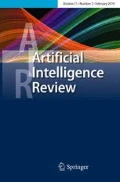Abstract
Over the years, the presence of knowledge partitioning (KP) in human function learning data has been used to argue that mixture-of-experts models (MOE) constitute a psychologically plausible explanation of human performance, and that the experts used by humans are always linear. These claims recently led to the proposition of the population of linear experts model (POLE). In this paper, variations of the firefighting paradigm developed by Lewandowsky and his colleagues, which initiated research about KP, were used to explore the psychological plausibility of MOE in general and POLE in particular. In a first experiment, these statements were tested by modifying the test display of the firefighting paradigm. The results showed that adding irrelevant information to the display resulted in a smaller proportion of partitioning participants. Also, some participants used non-linear experts to partition the stimulus space. This new type of KP was further explored in a second study, which included more training sessions. The results suggest that linear KP disappears with practice and that non-linear partitioning reflects the incapacity to correctly estimate the position of the function’s vertex. It is concluded that MOE are adequate psychological models, but that the linearity and ubiquity claims of the POLE model need to be weakened.
We’re sorry, something doesn't seem to be working properly.
Please try refreshing the page. If that doesn't work, please contact support so we can address the problem.
References
Bishop CM (1995). Neural networks for pattern recognition. Oxford University Press, New York
Corkill DD (1991). Blackboard systems. AI Experts 6: 40–47
DeLosh EL, Busemeyer JR and McDaniel MA (1997). Extrapolation: the sine qua non for abstraction in function learning. J Exp Psychol Learn Mem Cogn 23: 968–986
Epstein SL (1992). The role of memory and concepts in learning. Minds Machines 2: 239–265
Epstein SL (1994). For the right reasons: the FORR architecture for learning in a skill domain. Cogn Sci 18: 479–511
Goldstein EB (1999). Sensation & perception. Brooks/Cole Publishing Company: Pacific Grove, CA
Harris HD, Minda JP (2005) Function learning with an ensemble of linear experts and off-the-shelf category-learning models. In: Bara BG, Barsalou L, Bucciarelli M (eds) Proceedings of the 27th annual conference of the cognitive science society, Erlbaum Associates, Mahwah, NJ pp 905–910
Heit E and Bott L (2000). Knowledge selection in category learning. Psychol Learn Motiv 39: 163–199
Jacobs RA, Jordan MI, Nowlan SJ and Hinton GE (1991). Adaptive mixtures of local experts. Neural Comput 3: 79–87
Kalish ML, Lewandowsky S and Davies M (2005). Error-driven knowledge restructuring in categorization. J Exp Psychol Learn Mem Cogn 31: 846–861
Kalish ML, Lewandowsky S and Krushcke JK (2004). Population of linear experts: Knowledge partitioning and function learning. Psychol Rev 111: 1072–1099
Lewandowsky S, Kalish M and Ngang SK (2002). Simplified learning in complex situations: Knowledge partitioning in function learning. J Exp Psychol Gen 131: 163–193
Lewandowsky S and Kirsner K (2000). Knowledge partitioning: context-dependent use of expertise. Mem Cogn 28: 295–305
Little DR, Lewandowsky S, Heit E (in press) Ad hoc category restructuring. Mem Cogn
Minsky M (1986). The society of mind. Simon and Schuster, New York
O’Leary C (2005) Reuse and arbitration in diverse societies of mind. In: Proceedings of The sixteenth Irish conference on artificial intelligence and cognitive science, Portstewart, University of Ulster, pp 369–378
Singh P (2003). Examining the society of mind. Comput Informat 22: 521–543
Yang L-X and Lewandowsky S (2003). Context-gated knowledge partitioning in categorization. J Exp Psychol Learn Mem Cogn 29: 663–679
Author information
Authors and Affiliations
Corresponding author
Rights and permissions
About this article
Cite this article
Hélie, S., Giguère, G., Cousineau, D. et al. Using knowledge partitioning to investigate the psychological plausibility of mixtures of experts. Artif Intell Rev 25, 119–138 (2006). https://doi.org/10.1007/s10462-007-9024-7
Published:
Issue Date:
DOI: https://doi.org/10.1007/s10462-007-9024-7

